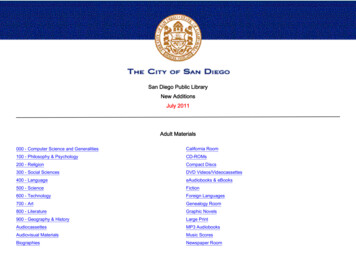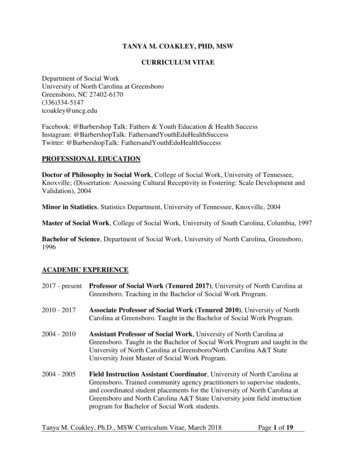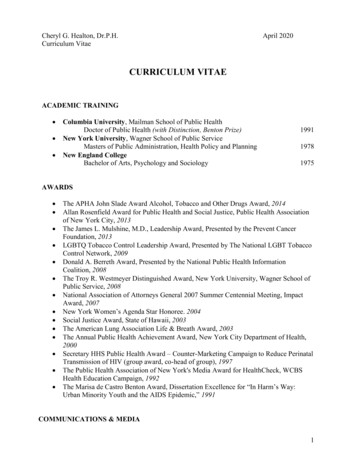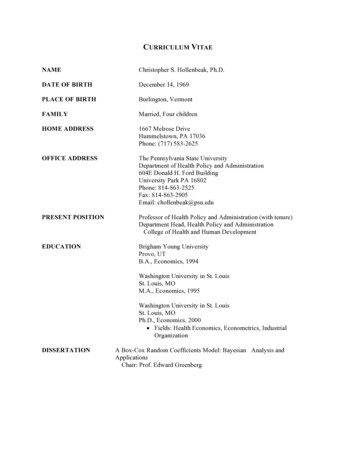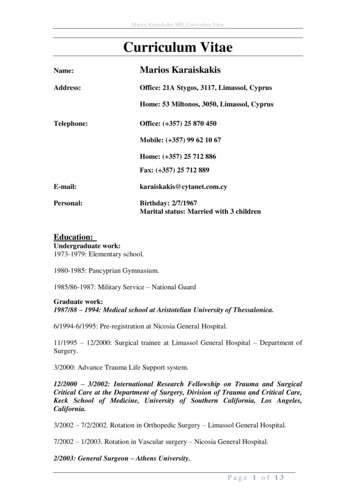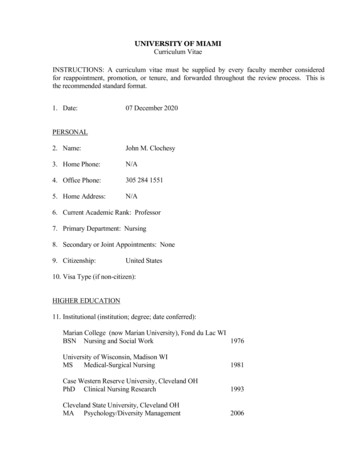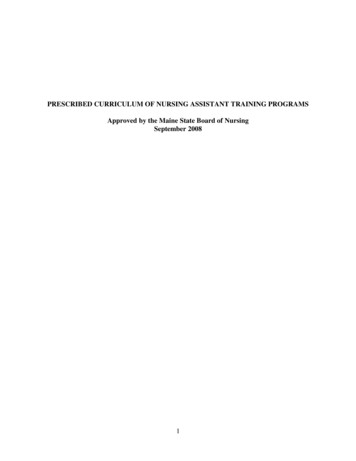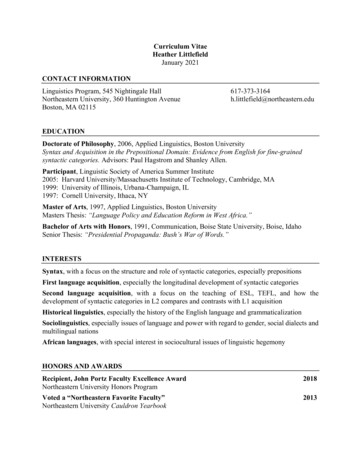
Transcription
Curriculum VitaeHeather LittlefieldJanuary 2021CONTACT INFORMATIONLinguistics Program, 545 Nightingale HallNortheastern University, 360 Huntington AvenueBoston, MA CATIONDoctorate of Philosophy, 2006, Applied Linguistics, Boston UniversitySyntax and Acquisition in the Prepositional Domain: Evidence from English for fine-grainedsyntactic categories. Advisors: Paul Hagstrom and Shanley Allen.Participant, Linguistic Society of America Summer Institute2005: Harvard University/Massachusetts Institute of Technology, Cambridge, MA1999: University of Illinois, Urbana-Champaign, IL1997: Cornell University, Ithaca, NYMaster of Arts, 1997, Applied Linguistics, Boston UniversityMasters Thesis: “Language Policy and Education Reform in West Africa.”Bachelor of Arts with Honors, 1991, Communication, Boise State University, Boise, IdahoSenior Thesis: “Presidential Propaganda: Bush’s War of Words.”INTERESTSSyntax, with a focus on the structure and role of syntactic categories, especially prepositionsFirst language acquisition, especially the longitudinal development of syntactic categoriesSecond language acquisition, with a focus on the teaching of ESL, TEFL, and how thedevelopment of syntactic categories in L2 compares and contrasts with L1 acquisitionHistorical linguistics, especially the history of the English language and grammaticalizationSociolinguistics, especially issues of language and power with regard to gender, social dialects andmultilingual nationsAfrican languages, with special interest in sociocultural issues of linguistic hegemonyHONORS AND AWARDSRecipient, John Portz Faculty Excellence AwardNortheastern University Honors Program2018Voted a “Northeastern Favorite Faculty”Northeastern University Cauldron Yearbook2013
Littlefield,2Nominated for the university-wide Teaching Excellence Award 2012, 2011, 2010, 2008, 2004Northeastern UniversityGraduate School of Arts and Sciences FellowshipApplied Linguistics Program, Boston University2000-2001Phi Sigma Iota (Foreign Language Honor Society)Boston University1997, 2000Graduate School of Arts and Sciences FellowshipAfrican Studies Program, Boston University1997-2000Linguistic Society of America Summer Institute FellowshipUniversity of Illinois, Urbana-Champaign1999Foreign Language Area Studies (FLAS) FellowshipAfrican Studies Program, Boston University1996-1997Forensics ScholarshipBoise State University Speech and Debate Team1988-1991Harvey Pitman Communication Scholarship AwardBoise State University1989-1990Communication Department Scholarship AwardBoise State University1987-1988ACADEMIC EMPLOYMENT AND TEACHING HISTORYTeaching Professor2019 - presentNortheastern University, Linguistics Program, Boston, MAResponsible for designing and teaching four linguistics courses per academic year, as well as beingthe Head Advisor and the Assistant Director for the Linguistics Program.Associate Teaching Professor (Associate Academic Specialist)2012 - 2019Northeastern University, Linguistics Program, Boston, MAResponsible for designing and teaching four linguistics courses per academic year, as well as beingthe Head Advisor and the Assistant Director for the Linguistics Program.Assistant Academic Specialist2007 - 2012Northeastern University, Linguistics Program, Boston, MAResponsible for designing and teaching five linguistics courses per academic year, as well as beingthe Head Advisor for the Linguistics Program.Adjunct Lecturer1998 - 2017Boston University, School of Education, Boston, MAResponsible for all levels of planning and teaching graduate-level courses in linguistics.Postdoctoral Teaching Associate2005 - 2007Northeastern University, Linguistics Program, Boston, MADeveloped and taught linguistics courses for the undergraduate Linguistics Program.
Littlefield,3Adjunct Lecturer1998 - 2007Northeastern University, School of Professional and Continuing Studies, Boston, MAPlanned and taught introductory level linguistics courses.Adjunct LecturerNortheastern University, Linguistics Program, Boston, MADesigned and taught various undergraduate linguistics courses.1999 - 2005Adjunct Lecturer2000Boston University, Sargent College of Health & Rehabilitation Sciences, Boston, MAPlanned and taught a course on typical language acquisition for Speech Pathology students.Teaching Assistant, Syntax I: Government and Binding1998Boston University, Linguistics Program, Boston, MAAssisted in teaching graduate-level syntax; designed and led weekly practice and review sessions.Teaching Assistant, Language, Culture and SocietyBoston University, Linguistics Program, Boston, MAAssisted in teaching undergraduate course; led weekly discussion groups.1997ESL Instructor1994 - 1996EF International Language Schools, Brookline, MADesigned and taught courses, ranging from beginning listening and speaking skills to courses foradvanced ESL learners in literature, fiction writing, acting, public speaking, and folk music.TEFL InstructorUnited States Peace Corps, Guinea, West AfricaTaught English to beginning and advanced students at Lycée Poudriére.1992 - 1993UNDERGRADUATE COURSES DESIGNED AND TAUGHTDesigned all aspects of each course including content, text selection, and method of instruction;responsible for all aspects of instruction, including preparation and presentation of all in-classactivities and lectures, design of all assessments, and evaluation of student work. All courses are forfour-credits unless otherwise noted. The academic terms in which each course was taught areindicated, with student enrollments provided in parentheses; sections taught for extra compensationare marked with an asterisk (*).I. LINGUISTICS PROGRAM, Northeastern UniversityAfrican Linguistics (LIN/AFRU428; LING3428)Surveys the languages of Africa, the linguistic structures that are typically associated with Africanlanguages, and sociolinguistic topics such as the effects of colonization on national languagepolicies. [Fall 2009 (5); Fall 2003 (5); Winter 2002 (7); Spring 1999 (8)]
Littlefield,4English Now and Then (LING 1449)Introduces the basic elements of linguistic structures while also covering the broad lines of changesin the English language. [Fall 2018 (13*)]History of the English Language (LIN/ENGU454; LING 3454)Covers the development of English, emphasizing the linguistic structures that have changed and thesocial contexts contributing to those changes. [Fall 2020 (10); Spring 2013 (8*; Honors section);Fall 2012 (19); Fall 2011 (15); Fall 2010 (11); Fall 2009 (11); Fall 2007 (21); Spring 2007 (41); Fall2005 (12); Spring 2005 (16); Fall 2003 (23); Spring 2003 (47); Spring 2002 (36); Spring 1999 (26)]Introduction to Language and Linguistics (LIN/ENGU150; LING 1150)Introduces the structure of language (morphology, phonetics, phonology, syntax and semantics),and other domains (processing, acquisition, variation, etc.). [Spring 2007 (51); Summer 2007 (43*);Fall 2006 (44); Summer 2006 (39*); Fall 2004 (50); Fall 2002 (32; 33); Winter 2001 (22)]Introduction to Syntax (LIN/ENGU450)Introduces students to generative syntax; topics include constituency, binary branching, theta roles,binding, movement, and Case. [Spring 2002 (18); Winter 2001 (10); Spring 2000 (15)]Language and Culture (LIN/SOAU412; LING 3412)Surveys topics in anthropological linguistics and sociolinguistics, including the relationshipbetween language and culture, ethnography of communication, discourse analysis, languagevariation, language and gender. [Spring 2020 (17); Fall 2018 (19); Spring 2018 (17); Spring 2017(18); Spring 2016 (18); Fall 2014 (14); Spring 2014 (8; Honors section); Fall 2013 (19); Fall 2012(17); Fall 2011 (14); Spring 2011 (26); Spring 2009 (35); Fall 2009 (19); Fall 2007 (30); Fall 2006(30*); Fall 2005 (21); Fall 2004 (19); Fall 2003 (20); Fall 2002 (37); Spring 2001 (34); Fall 2001(31); Winter 2000 (22)]Language and Gender (LIN/ENGU456 ; LING3456)Explores the role of language in the construction of gender identities, the stereotypes and actualpatterns of language usage. [Spring 2020 (9); Fall 2017 (13); Fall 2015 (7); Spring 2014 (16); Spring2010 (15); Spring 2008, Fall 2006 (25); Fall 2004 (23); Spring 2001 (13)]Linguistic Analysis (LIN/ENGU350; LING2350)Strengthens students’ emergent analytic skills after taking Introduction to Linguistics. Languageuniversals and implicational hierarchies are introduced. [Spring 2019 (18); Fall 2018 (14); Fall2014 (19); Spring 2013 (6; 15*); Spring 2012 (18*; 25); Fall 2011 (15); Fall 2010 (17); Spring 2010(17; 18*), Spring 2008 (20); Spring 2006 (13); Spring 2004 (23); Winter 2000 (14)]Linguistics at Northeastern, 1 credit course (LING1000)Helps incoming freshmen with a declared linguistics major to adjust to college life during their firstterm and introduces them to the requirements and opportunities within the major. [Fall 2018 (4*);Fall 2017 (4*); Fall 2016 (5*); Fall 2015 (7*); Fall 2014 (4*); Fall 2013 (6*); Fall 2012 (1*); Fall2011 (9*)]
Littlefield,5Research Seminar in Linguistics (LING4891)Provides students with independent research experience: identifying a hypothesis, designing andconducting the project, and presenting the results. [Spring 2020 (8*); Spring 2019 (6*); Spring 2018(7*); Spring 2017 (8); Spring 2016 (6*); Spring 2015 (6*); Spring 2014 (4*)]Semantics (LIN/ENG452; LING3452)Surveys the field of semantics, covering reference, lexical semantics, truth conditions, factivity,modality, semantic roles, deixis, speech acts, componential analysis, cognitive and formalsemantics. [Fall 2015 (7); Fall 2014 (20*); Spring 2009 (45); Spring 2005 (12); Winter 1999 (6)]Seminar in Linguistics: Morphology (LIN/ENGU654)Covers the major theoretical and methodological approaches to the study of word structure andformation. [Spring 2005 (7); Spring 2000 (7)]Seminar in Linguistics: Pidgins and Creoles (LIN/ENGU654)Introduces students to the pidgins and creoles of the world, their typological features, the role ofcontact languages and other linguistic substrata on language creation. [Winter 2002 (13)]Seminar in Linguistics: Grammaticalization (LIN/ENGU654)Explores the topic, including a brief history of the field, the causes and mechanisms ofgrammaticalization, and current issues and topics. [Spring 2007 (17)]Seminar in Linguistics: Lexical and Functional Categories in Minimalist Syntax (LING 4654)Introduces students to the Minimalist Program and investigates how the distinction between lexicaland functional categories are explanatory or problematic in this model. [Spring 2011 (9)]Sociolinguistics (LIN/SOCU442; LING3442)Surveys topics in the field: language variation, ode-switching, language change and maintenance,language and identity, standard versus vernacular varieties, and language policy and planning.[Spring 2019 (10); Spring 2015 (10); Fall 2005 (29)]Topics in Linguistics: Language Acquisition (LIN/ENGU458; LING3458)Covers the typically expected development of linguistic structures, and the contributing factors andtheories. Students complete project required data collection, transcription and analysis. [Fall 2019(13); Spring 2018 (7); Fall 2016 (17); Spring 2015 (9); Fall 2013 (4); Fall 2012 (13); Fall 2010 (14);Spring 2008 (19)]Topics in Linguistics: Lexical and Functional Categories (LIN/ENGU458)Explores the distinction drawn in most syntactic models between lexical and functional categoriesand how this distinction applies to acquisition, aphasia, and other domains. [Spring 2004 (12)]Topics in Linguistics: Humor and Verbal Play (LING3458)Investigates the linguistic and cultural bases for and constraints on humor as well as itscommunicative purposes and effects at an individual and collective level. [Spring 2016 (10)]
Littlefield,6Topics in Linguistics: Minimalist Syntax (LIN/ENGU458)Introduces students to the Minimalist Program. Students learn to apply the Minimalist frameworkto various structures in English and other languages. [Spring 2006 (9)]II. HONORS PROGRAM, Northeastern UniversityHonors Inquiry: Language in Literature: Me Tarzan, You Jane! The Uses of Language inLiterature: Linguistic Reality or Linguistic Fiction? (HONR 1209; HONR 1310)Uses prominent literary works as a springboard to introduce topics in linguistics, including languageacquisition, conversational norms, dialects, and language construction. [Fall 2020 (17); Fall 2019(17); Fall 2018 (17*); Fall 2017 (17); Fall 2016 (17); Fall 2015 (18*); Fall 2014 (19*); Fall 2013(19*)]HONR 3310: Honors Seminar: Language and power: Linguistic diversity, discrimination andlanguage identity as a human rightConsiders linguistic biases and beliefs in the United States, and how they relate to discriminationand social justice resulting in microagressions, denial of educational, employment, and housingopportunities, and even forced assimilation of minority groups. [Summer 2020 (16)]III. PROGRAM FOR UNDECLARED STUDENTS, Northeastern UniversityFreshmen Seminar: To Speak or Not to Speak, 1 credit course (FSEM1101)Introduces undeclared freshmen to the field of language acquisition using observations andrecordings of three- to four-year old children. [Fall 2013 (13*); Fall 2012 (10*)]IV. COLLEGE OF PROFESSIONAL STUDIES, Northeastern UniversityLanguage and Gender (SOC4179)Designed in response to a call for new-course proposals, this course surveys the literature andfindings of language and gender research. [Winter 2005 (8*)]Linguistics (ENG4501)Introduces students to the basic areas of linguistics and touches on a variety of sociolinguistic topics.[Winter 2007 (6*); Winter 2006 (13*); Winter 2005 (16*); Winter 2004 (24*); Winter 2003 (14*);Winter 2002 (10*); Winter 2001 (9*); Fall 1999 (13*); Fall 1998 (10*)]GRADUATE COURSES DESIGNED AND TAUGHTDevised the curriculum for each course, and carried out all aspects of instruction. The academicterms in which each course was taught are indicated, with student enrollments provided inparentheses; all graduate courses are taught for extra compensation.I. ENGLISH DEPARTMENT, Northeastern UniversityHistory of the English Language (ENG 3402; ENGL 7324)Introduces the structural features of English across the major eras of development, emphasizing howand why the language changed. [Fall 2010 (7); Fall 2003 (15); Spring 2002 (4)]
Littlefield,7Linguistics and Writing (ENG 3322)Adopts a linguistic approach to the analysis and study of written discourse; discusses historicaldevelopment of writing systems, text types, and the ideology of written discourse. [Fall 2000 (5)]Semantics (ENG 3401)Introduces students to a variety of methods of analyzing meaning, with a focus on lexical semantics.[Winter 1999 (5)]II. SCHOOL OF EDUCATION, Boston UniversityIntroduction to Language and Linguistics (SED LS602; SED LS565)Introduces the basic structures of language (phonetics, phonology, morphology, syntax andsemantics), psycholinguistics (processing and acquisition), the social aspects. [Summer 2016 (4);Summer 2015 (4); Summer 2014 (3); Summer 2012 (4); Summer 2011 (2); Summer 2010 (7);Summer 2009 (4); Summer 2008 (10); Summer 2007 (6); Summer 2006 (6); Summer 1998 (21)]Language Acquisition (SED LS566)Covers the milestones and developmental patterns for typically developing children, the factorscontributing to acquisition, and the main explanatory models. Students learn data collection,transcription, and analysis. [Summer 2016 (4); Summer 2015 (8); Summer 2014 (2); Summer 2011(7); Summer 2010 (7); Summer 2009 (8); Spring 2008 (14); Summer 2008 (11); Spring 2007 (3);Summer 2007 (4); Summer 2006 (8); Summer 2005 (3)]Introduction to Linguistics and Language Acquisition (SED LS560; SED LS560E)Introduces students with no background in linguistics to the field of linguistics and the generalpatterns and theories of language acquisition. [Summer 2017 (8); Fall 2001 (10)]III. SARGENT COLLEGE OF HEALTH AND REHABILITATION SCIENCES,Boston UniversityLanguage Theories, Acquisition, and Analysis (CD708)Provides students in Speech Pathology with an understanding of the stages of typical languageacquisition and with the basic skills required to analyze a child language sample. [Fall 2000 (31)]DIRECTED RESEARCHSupervised all aspects: topic development, methods, data collection and analysis, and presentationof the results. Projects are listed by completion date; grants and presentations are noted.I.UNDERGRADUATE HONORS PROJECTS, Northeastern UniversityAll honors projects in linguistics require an approved proposal in addition to eight credit hours ofwork; these projects typically take students three semesters to complete. All projects working withhuman subjects require Institutional Review Board (IRB) approval, and beginning in 2013 allprojects require a second reader.Gu, Eric. (in progress). “Impoliteness in Online Echo Chambers on Twitter.” Second reader:Adam Cooper.
Littlefield,8Wilson, Molly. (in progress). “Gendered Irony Use in Middle Grade Literature.” Second reader: Robert Painter.Doroski, Leah. (2019). “Child language acquisition of possession forms in Inuktitut.” Secondreader: Shanley Allen.! Poster: Research, Innovation, and Scholarship Expo (RISE), Northeastern University,April 5, 2018.! Poster: Research, Innovation, and Scholarship Expo (RISE), Northeastern University,April 4, 2019.Robbins, Parker. (2019). “The Effect of Prescriptive Rules and Instructions on the GrammaticalityJudgment Task.” Honors Project. Second reader: Adam Cooper.!IRB# 18-12-20.!Undergraduate Research and Creative Endeavor Award, 1,900. NortheasternUniversity Office of Undergraduate Research and Fellowships, January 2019.Published in: Northeastern University Working Papers in Linguistics (NEUWPL),Volume 4. Robert Painter, editor. Northeastern University Linguistics Program.Honors Conference Travel Award, 650. Northeastern University Honors Program,April 2019.Poster: Research, Innovation, and Scholarship Expo (RISE), Northeastern University,April 4, 2019.Presentation: 13th Annual Cornell University Linguistics Colloquium (CULC13),Ithaca, NY, April 28, 2019.!!!!Segarra, Jasmine. (2019). “An assessment of first-language (L1) acquisition and extravertedbehaviors.” Second readers: Shiti Malhotra and Neal Pearlmutter.!IRB# 18-07-22.!Undergraduate Research and Creative Endeavor Award, 720. NortheasternUniversity Office of Undergraduate Research and Fellowships, January 2019.Poster: Research, Innovation, and Scholarship Expo (RISE), Northeastern University,April 4, 2019.!Larsen, Erika. (2018). “Still super, but not as super: A linguistic analysis of gendered portrayals insuperhero movies.” Second reader: Robert Painter.! Poster: Research, Innovation, and Scholarship Expo (RISE), Northeastern University,April 5, 2018.Lustig, Adanya. (2018). “Burying the lede: a linguistic analysis of lede-writing style over time.”Second reader: Robert Painter.! Poster: Research, Innovation, and Scholarship Expo (RISE), Northeastern University,April 5, 2018.! Published in: Northeastern University Working Papers in Linguistics (NEUWPL),Volume 3. Shiti Malhotra, editor. Northeastern University Linguistics Program.Pire, Nicolette. (2018). “Analysis of language used discussing deafness online.” Second reader:Amy Lieberman, Boston University.! Poster: Research, Innovation, and Scholarship Expo (RISE), Northeastern University,April 5, 2018.! Published in: Northeastern University Working Papers in Linguistics (NEUWPL),Volume 3. Shiti Malhotra, editor. Northeastern University Linguistics Program.
Littlefield,9Marsalisi, Callie. (2018). “Search engine behaviors across generations.” Second reader: AdamCooper.! IRB# 17-04-26.! Advanced Research/Creative Endeavor Award ( 1,460).! Poster: Research, Innovation, and Scholarship Expo (RISE), Northeastern University,April 5, 2018.Elliott, Mary. (2017). “The effects of students’ use of African American Vernacular English onteachers’ attitudes and evaluations.” Second reader: Neal Pearlmutter.! IRB# 10-02-05.! Research grant from the Office of Undergraduate Research and Fellowships ( 250).Fielding, Heather. (2015). “Self-directed speech as a tool for increased reading performance.”Second reader: Neal Pearlmutter.! IRB# 14-09-24.! Grant from the Honors Program ( 500)! Poster: 13th Annual Honors Evening Research Expo (HERE), Northeastern University,April 14, 2015.! Poster: Research, Innovation, and Scholarship Expo (RISE), Northeastern University,April 9, 2015.! Poster: Cornell Undergraduate Linguistics Colloquium, Ithaca, NY, April 18-19, 2015.Coffin, Lindsay. (2014). “The referential self in English language acquisition.” Second reader:Neal Pearlmutter.! Poster: Research, Innovation, and Scholarship Expo (RISE), Northeastern University,April 10, 2014.Riva (Patten), Brittany. (2014). “ASL for SLPs: American Sign Language for speech-languagepathologists.” Second reader: Neal Pearlmutter.! Poster: 11th Annual Honors Evening, Northeastern University, April 8, 2014.Proctor, Leanne. (2013). “Successful strategies?: Linguistic elements used in advertising.”Second reader: Neal Pearlmutter.! IRB# 13-01-21.! Gladys A. Brooks Award from the Honors Program ( 530)! Poster: 10th Annual Honors Evening, Northeastern University, April 9, 2013.Kennedy, Danielle. (2013). “Social influence on social essentialism.” Second reader: CraigGruber.! IRB# 13-03-04! Gladys Brooks Award from the Honors Program ( 240)! Poster: 10th Annual Honors Evening, Northeastern University, April 9, 2013.Martinek, Lisa. (2013). “Solving the problem of the hierarchy of projections in MinimalistSyntax: Evidence from L1 longitudinal acquisition patterns.” Second reader: NealPearlmutter.! Poster: Research, Innovation, and Scholarship Expo (RISE), Northeastern University,March 29, 2012.! Poster: Cornell Undergraduate Linguistics Colloquium, Ithaca, NY, April 2012! Poster: Research, Innovation, and Scholarship Expo (RISE), Northeastern University,March 22, 2013.
Littlefield, 10!!!!Presented: Northeastern University Linguistics Program, April 16, 2013.Paper: Cornell Undergraduate Linguistics Colloquium, Ithaca, NY, April 20, 2013.Poster: 10th Annual Honors Evening, Northeastern University, April 9, 2013.Travel Grant from the Northeastern University Honors Program.Thomann, Hollis. (2013). “The processing of fine-grained prepositional elements.” Secondreader: Neal Pearlmutter.! IRB# 13-01-20.! Gladys Brooks Award from the Honors Program ( 775)! Poster: 10th Annual Honors Evening, Northeastern University, April 9, 2013.Rubenstein, Cale. (2012). “Evidence from L1 acquisition for a functional spectral typology of theverbal domain.”! Poster: Research, Innovation, and Scholarship Expo (RISE), Northeastern, March 29,2012.! Poster: Cornell Undergraduate Linguistics Conference, Ithaca, NY, April 2012.! Poster: 9th Annual Honors Evening, Northeastern University, April 10, 2012.Funke, Elise. (2012). “Language, dialect, and power in the courtroom.”! Honors Senior Fellowship Award ( 2000)Ketcham, Eric. (2011) “Internet discourse: The application of discourse analysis to instantmessaging communication.”! Provost Undergraduate Research Award ( 300)! Honors Early Research Grant ( 250)! Poster: 8th Annual Honors Evening, Northeastern University, April 12, 2011.Bauermeister, Mischa. (2008) “Battle of words: Language, gender and power in the courtroom.”! Provost Undergraduate Research Award ( 900)II. DIRECTED STUDY RESEARCH, Northeastern UniversityDirected study research projects consist of four-credit hours projects that are typically completedover the course of a single semester, although development of the concept likely takes place inadvance of beginning the research project.Olumhense, Bridgette. (2020). “280 Character Breakdown: A Survey of President Trump’sTweets in 2016 and 2020.”Castillo, Cruz. (2017). “Motherese in American Sign Language.”Shah, Monica. (2016). “An analysis of language and gender in political roundtables.”Cathcart, Julia. (2015). “Morphosyntactic complexity in narratives of sexual assault.”Siembor, Anna. (2013). “How a multilingual framework in social service gatekeeping canimprove clients access to services.” Experiential Education Directed Study.Silvestri, Alicia. (2013). “Gendered comedy complexity in Archer.”Donadio, Jillian. (2013). “Acquisition of non-literal and ambiguous verb phrases.”Ramirez, Michaela. (2013). “Inventory and categorization of Eve and Sarah’s check-verbs.”Fernandes, Desiree. (2012). “A pilot study of Cape Verdean Criolou: A linguistic comparison ofthe structure of the two primary dialects, and a survey of speakers’ attitudes toward thosedialects and the movement to create a “standard” language.”Robbins, Fenna. (2011). “Linguistic features in female and male sports reporting.”
Littlefield, 11Stewart, Victoria. (2011; incomplete). “Problems with the prepositional domain in German.”Hopkins, Jessica, Jaclyn Karvales and Fran Sales. (2011). “She threw up the pizza!; Processingtimes of lexical and functional prepositional elements.” Poster: Northeastern Research and Scholarship Expo, April 2011Martinek, Lisa and Cale Rubenstein. (2011). “Using a fine-grained approach to examine thelongitudinal patterns of the first language acquisition of the English verbal domain.”Schultz, Carolyn and Mariah Warren. (2011). “Using a fine-grained approach to examine thelongitudinal patterns of the first language acquisition of the English nominal domain.”Aravind, Athulya and Grace Sullivan. (2011). “A hierarchical approach to adverb distributionwithin Minimalism.”! Poster: Northeastern Research and Scholarship Expo, April 2011! Presented: 9th Annual Undergraduate Linguistics Colloquium, Harvard University,April 2011Heigh, Crystal. (2011). “The difficulties of second language learners’ understanding and use ofEnglish prepositional elements.”! Awarded a Provost Undergraduate Research Award ( 400)! Poster: Cornell Undergraduate Linguistics Conference, Ithaca, NY, April 2011! Poster: Northeastern Research and Scholarship Expo (RISE), Northeastern University,April 2011Kubrin, Mara. (2010). “Difficulties with second language acquisition of English prepositionalelements.”Piorek, Samantha. (2010). “Linguistic features and sex role stereotypes of personal ads oncraigslist.org.”Ablott, Kristine. (2009). “Evidence for fine-grained syntactic categories in the nominal domain”! Presented: 7th Annual Undergraduate Linguistics Colloquium at Harvard University,April 2009Greene, Sarah. (2009). “The links between mirror neurons and autism, a critical review.”DeSantis, Chelsea. (2008). “A Fine-grained approach to second language acquisition and theprepositional domain.”! Paper accepted, 6th Annual Undergraduate Linguistics Colloquium at HarvardUniversity, April 2008Cross, Lauren and Jaclyn Karvelas. (2008). “Developmental patterns as evidence for a finegrained analysis of the verbal domain.”Swanson, Alexandra. (2007). Semiotics of web design.Garza, Leah. (2006). “The verbal domain: Evidence for fine-grained categories.”! Poster: NU Women in Science Poster Exposition, Northeastern University, April 2006Gleason, Lindsey. (2006). “Verbs and children: A study of language acquisition in children.”! Poster: NU Women in Science Poster Exposition, Northeastern University, April 2006Hayes, Emily. (2006). “Classifiers in American Sign Language.”! Poster: NU Women in Science Poster Exposition, Northeastern University, April 2006Krulikowski, Kim. (2006). “Semi-lexical prepositions in German.”! Poster: NU Women in Science Poster Exposition, Northeastern University, April 2006Saadi, Zina. (2005). “Evidence of developmental patterns in the acquisition of a language: Astudy of prepositions and particles in Arabic.”
Littlefield, 12Carney, Danielle. (2005). “Do children acquire prepositions, adverbs, and particles by imitatingtheir parents?”Kaneko, Masako. (2004). “Acquisition of Japanese postpositions.”Penuel, Tabitha. (2004). “Another look at ‘down’ and what it can tell us about child languagedevelopment.”III. RESEARCH SEMINAR PROJECTSProjects are completed as part of the four-credit course “Research Seminar” in which students workon independent research. Weekly meetings are used to promote progress and collaboration.Ellam, Rylie. (2020). “Current Usage and Views of SimCom.”Leavitt, Gabrielle. (2020). “#YOLO- Younger vs Older Language Options Generational Impacton Neologism Acceptance.”Mohler, Bridget. (2020). “A Linguistic Analysis of Satan’s Performance of Gender in ParadiseLost.”! Poster: Research, Innovation, and Scholarship Expo (RISE), Northeastern University,April 9, 2020.O’Connell, Giuliana. (2020). “Phonological Acquisition and Transfer in Spanish-EnglishBilingual Children: A Review.”Price, Samantha. (2020). “An Exploration of Verbal Irony Across Languages.”Aucella, Kathryn. (2019). “An analysis of differentiated language use by gender in professionalwriting.”Breite, Li. (2019). “Studies in Case hierarchies.”Isaacs, Avery. (2019). “Language in dance education.”Leventer, Ashley. (2019). “Gendered interpretations of sports metaphors.”Wilkins, Lauren. (2019). “Gendered language describing artists.”Jones, Shaughnessy. (2018). “Phonological iconicity.”Richardson, Donovan. (2018). “Measuring second language learners’ speaking frequency: Pilotstudy of best practices.”Shaller, Caitlin. (2018). “Do we all imagine the same way?”Benson, Julia. (2017). “Labelling effects on stigma surrounding disabilities.”! Northeastern University Working Papers in Linguistics (NEUWPL), Volume 2. ShitiMalhotra, editor. Northeastern University Linguistics Program.Boni, Chase. (2017). “On generational trends in the phonetics of Rhode Island English.”Gallant, Lydia. (2017). “A comparative analysis of first language development in first- andsecond-born siblings”Hunter-Schlorholtz, Arin. (2017). “Effects of subtitled second language content in languageacquisition.”Powers, Hannah. (2017). “Cross-linguistic approaches to gender in personal pronouns.”! Northeastern University Working Papers in Linguistics (NEUWPL), Volume 2. ShitiMalhotra, editor. Northeastern University Lin
Northeastern University, 360 Huntington Avenue h.littlefield@northeastern.edu Boston, MA 02115 . University of Illinois, Urbana-Champaign Foreign Language Area Studies (FLAS) Fellowship 1996-1997 African Studies Program, Boston University Forensics Scholarship 1988-1991
